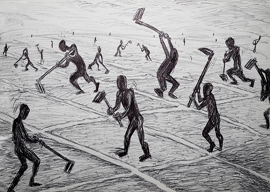
August 18, 2017

Source: Bigstock
Few people will speak in favor of slavery now. It’s illegal in every country with any claim to being civilized. I doubt if even the white supremacists who brought violence to Charlottesville, Va., last weekend would wish to reintroduce what was once known as the “peculiar institution.” Indeed their words and acts suggest that they see themselves as being now the deprived underdogs.
It requires an effort of the imagination to recognize that throughout the history of civilizations, slavery has been the norm, not the exception. Athens and other Greek cities, Rome, and the monarchies and empires of the Middle East and Asia were all slave states, their economies dependent on slave labor. There were slaves in indigenous African kingdoms, and the Arab slave trade in Africa was centuries old when Europeans first transported Africans as slaves to their new colonies on the American continent. Europeans and Americans alike found biblical authority for slavery, and as late as the middle of the 18th century, Samuel Johnson was unusual in his detestation of slavery and in proposing a toast to “the next insurrection of negroes in the West Indies.”
In the new republic, the United States of America, “the shining city on the hill,” slavery became the dividing line between North and South. It wasn’t an absolutely clear-cut line, and the institution wasn’t the cause of the Civil War. There were other reasons the Southern states chose to secede from the Union: resentment of the growing power of the federal government in Washington, which infringed on “states’ rights”; resentment of the high tariff policy that protected the nascent Northern industries and damaged the Southern agrarian economy. When the Southern states elected to secede from the Union, as they believed was their constitutional right, the federal government in Washington went to war to preserve the Union, not to free the slaves. Lincoln’s Emancipation Proclamation didn’t come till late in the war and indeed did not apply to slaves in those states that had adhered to the Union. Lincoln indeed was in favor of repatriating freed slaves to Africa, or perhaps establishing them in free communities in the West Indies; both impractical ideas. After the brief period of Reconstruction, Southern (white) elites reestablished their position, finding means to deny black Americans political and civil rights for almost a hundred years.
Meanwhile, it was natural that the myth of the Old South and nostalgia for the Confederacy took root, fostered by song and legend. The North might have won the war, but the defeated South had most of the best tunes. And through novels, plays, and eventually films—such as D.W Griffith’s Birth of a Nation and then Margaret Mitchell’s Gone With the Wind—many great artistic successes were derived from looking backward to the South. It was natural, too, that statues of the heroes of the Confederacy should be raised in Southern cities and towns, and that the Confederate flag should be flown on public buildings.
It was equally natural that black Americans—black Southerners, especially—should resent this. The statues and the flag inevitably serve as a daily reminder of slavery, of the brutality and humiliation to which their ancestors were subjected. Their desire to be rid of these memorials to the oppressors of black Americans is understandable; and it is also understandable that this desire is shared by millions of liberally minded white Americans, too.